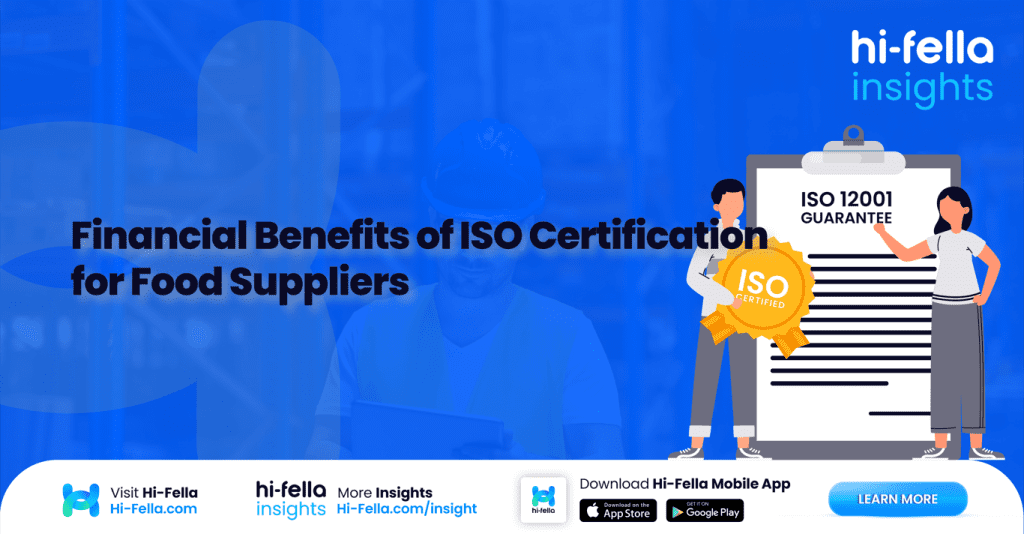Getting ISO-certified may not feel as exciting as launching a new product or entering a new market—but when it comes to long-term business growth, few investments are as quietly powerful. For food suppliers, ISO certification isn’t just a compliance checkbox—it’s a financial asset.
From unlocking premium clients to lowering operational costs and improving export potential, ISO standards like ISO 22000 (Food Safety Management) and ISO 9001 (Quality Management) deliver a measurable return. Let’s break down how going ISO-certified leads to real-world financial gains and strategic edge in the competitive food supply industry.
Competitive Advantage That Translates to Revenue
ISO certification—whether it’s ISO 22000 for food safety or ISO 9001 for quality management—acts as a trust anchor in a competitive and risk-sensitive global food market. Certification sends a clear message: “We don’t just follow procedures—we’ve embedded internationally recognised systems into our operations.”
This credibility matters especially when you’re trying to break into institutional or export markets. Multinational retailers, large food brands, and government buyers often have procurement policies that require ISO certification as a baseline. Without it, you’re simply excluded from the conversation—regardless of how good your product is.
Financially, this translates into access to higher-value contracts. ISO-certified suppliers can pitch to premium clients with confidence, knowing that they meet the hygiene, safety, and traceability benchmarks expected in regions like the EU, Japan, UAE, and North America.
But it doesn’t stop at first contact. Certification gives you better visibility and credibility on supplier platforms and procurement directories—which increases your chances of being selected during tenders or sourcing rounds. Think of it as SEO for B2B food trade: the better your credentials, the higher you rank in a buyer’s consideration set.
Over time, ISO-certified businesses tend to build stronger customer retention because buyers trust their systems. Clients know they won’t need to micromanage your quality assurance or worry about last-minute non-compliance issues. That trust gives you room to negotiate longer-term contracts, secure pre-orders, or even move toward private-label partnerships.
The result? Higher average order values, more stable revenue, and stronger lifetime customer value. ISO isn’t just a cost of doing business—it’s a growth multiplier when you’re serious about market expansion.
Operational Efficiency = Lower Costs
One of the most underrated benefits of ISO certification is its ability to refine your internal systems. The ISO framework is built around structured documentation, corrective action cycles, risk analysis, and preventive thinking—all of which push your organisation toward leaner, smarter, more proactive operations.
Let’s say you’re a mid-sized frozen food supplier. By adopting ISO 22000, you’re required to analyse hazards at every production step, track and monitor CCPs (critical control points), and maintain traceability from raw input to dispatch. This not only improves food safety—it also uncovers process inefficiencies, duplication, and waste that might otherwise go unnoticed.
Over time, this leads to measurable cost savings, including:
- Reduced waste and spoilage: With clearer SOPs and controls, you’re less likely to mislabel, undercook, or mishandle products. That means fewer batches get tossed or downgraded.
- Fewer non-compliance penalties or rejections: When audits come knocking—or export inspections take place—certified companies have their documentation, processes, and records ready. You reduce the risk of shipment holds, failed certifications, or government sanctions.
- Shorter lead times: Because ISO requires more precise scheduling and process control, you spend less time dealing with surprise breakdowns or emergency reworks. That makes your entire fulfilment cycle faster and more predictable.
- Better forecasting and inventory control: ISO frameworks help teams document historical output, variance trends, and risk points—which leads to more accurate forecasting. Better demand planning reduces stockpiling, overproduction, and cash flow constraints.
These aren’t abstract benefits—they’re measurable. For example, a company that used to lose 3% of output to QC rejections might bring that down to under 1% within a year of implementing ISO. A business running multiple rework cycles per month could reduce that by half once preventive maintenance becomes routine.
And here’s the kicker: once these efficiencies are embedded, they compound over time. The savings from fewer recalls this year become the budget for new product R&D next year. The time saved on compliance this quarter becomes the bandwidth to explore a new market next quarter.
Ultimately, ISO certification doesn’t just make you a safer supplier. It makes you a leaner, more cost-effective one—with the kind of operational muscle that gives you pricing power, scalability, and resilience in an unpredictable global food economy.
Easier Access to Financing and Partnerships
Banks, investors, and even supply chain partners increasingly view ISO certification as a de-risking mechanism. It shows you have proper controls in place, which makes you a safer bet for loans, credit lines, or trade partnerships.
This is particularly useful for food businesses in emerging markets or SME categories, where perceived risk often limits growth opportunities. By getting ISO-certified, you’re telling stakeholders: “We’re not just compliant—we’re structured, scalable, and future-ready.”
In some regions, ISO-certified companies are also eligible for government subsidies, export incentives, or procurement preferences, which can reduce your financing burden or improve your cash flow.
Reduced Audit Fatigue and Lower Compliance Costs
If you’ve ever sold into multiple international markets or dealt with buyers from different regions, you’ll know the pain of overlapping audits and inspections. One buyer wants your HACCP records, another wants a quality control audit, and yet another sends in their own third-party team to double-check everything.
ISO certification helps you consolidate and standardise your documentation, reducing the need for redundant audits. It builds a compliance infrastructure that satisfies most global buyers—and makes it easier to scale without constantly rebuilding systems.
That saves time, reduces administrative overhead, and lets your QA team focus on continuous improvement instead of repetitive paperwork.
Brand Premium and Market Positioning
In many food categories—especially those touching wellness, sustainability, or export—ISO certification can help justify a price premium. Buyers are more willing to pay extra for ingredients or products that come with certified traceability, quality controls, and food safety assurance.
Even in B2B supply chains, procurement teams use certifications to differentiate similar suppliers. That means ISO-certified suppliers are more likely to win tenders, get picked for strategic partnerships, or be considered for private-label collaborations.
The result is more than just revenue—it’s strategic positioning. You become a go-to, dependable supplier that customers keep coming back to—because you make their job easier.
Long-Term Resilience and Risk Reduction
Food supply chains are vulnerable to disruptions—recalls, contamination, geopolitical issues, climate events. ISO standards don’t make you immune, but they make you resilient. They equip you with systems for corrective action, risk management, and recovery.
That resilience has financial value. A supplier who can contain a recall quickly or prevent an issue from scaling into a crisis saves money, protects contracts, and avoids reputational damage.
ISO also prepares your business to adapt to regulatory changes, which is increasingly important in global trade. As standards evolve, ISO-certified companies already have the internal systems to adjust without massive rework—saving both time and resources.
Scaling Globally with the Right Platform
ISO certification is one piece of the growth puzzle—but to fully capitalise on it, you need access to the right networks. That’s where hi-fella comes in.
hi-fella is an export-import platform designed for food suppliers who are ready to go global. From curated exhibition opportunities and importer matchmaking to guidance on certification requirements in target markets, hi-fella helps you leverage your ISO credentials for real business growth.
When you list or exhibit on hi-fella, your ISO certification isn’t just a document—it becomes a competitive advantage. Buyers looking for safe, reliable, and scalable suppliers are more likely to choose you—and stay with you.
ISO = Investment, Not Expense
Getting certified may seem like a cost up front, but the payback is clear: more deals, stronger margins, smoother operations, and better positioning in a competitive market. ISO isn’t just about safety or quality—it’s about financial performance.
So if you’re looking to grow smarter, scale faster, and reduce your risk while increasing your value, ISO certification is a no-brainer.
And when you’re ready to turn that certification into market access and new partnerships, hi-fella is here to make the global trade game work in your favour.








